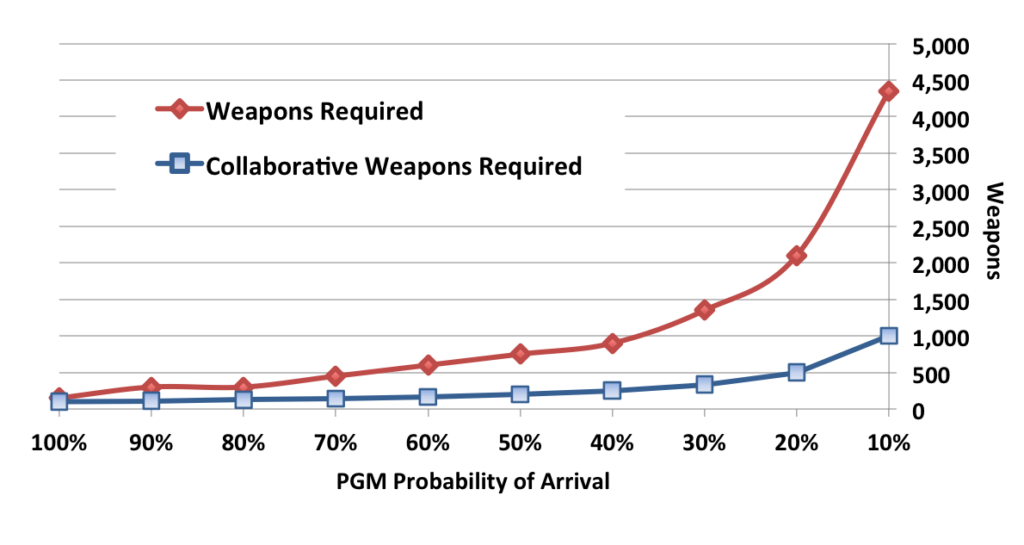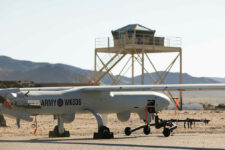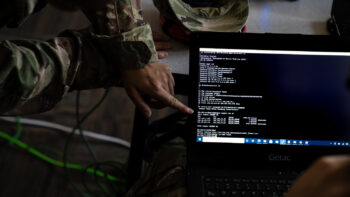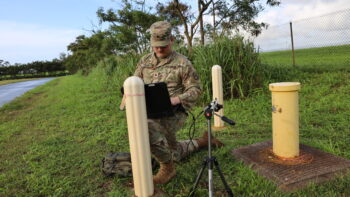
“Collaborative” weapons with artificial intelligence to coordinate their attacks can be dramatically more efficient.
The JEDI contract has been awarded to Microsoft. The Joint Artificial Intelligence Center is trying to craft a plan for how the US military will create and use AI throughout the military. Google has come back to the fold, committing the company to working with the Defense Department after the Maven controversy. China and Russia are pressing forward — hard — to develop and integrate AI into their national security establishments. Now, a congressionally-mandated panel has offered an interim path forward for the United States as it tries to harness and develop AI, machine learning, the cloud and all the other related technologies. What kind of job did they do? We submit this assessment by Martijn Rasser, a former senior intelligence officer at CIA who now thinks big thoughts at the Center for a New American Security. Read on! The Editor.
The United States reached a crucial milestone on its road to crafting a true national strategy for artificial intelligence (AI) this week. On Monday, the National Security Commission on Artificial Intelligence (NSCAI) submitted its interim report to Congress. Its mandate is important and wide-ranging: it must consider every way possible to further the development of AI, machine learning and related technologies for U.S. national security and defense needs.
There is a lot to like in this document. The commission identified five lines of effort that the U.S. government should focus on: R&D investments; national security applications of AI, training and recruiting AI talent; protecting and building upon U.S. technical advantages; and promoting global AI cooperation. Underpinning these areas of focus is the clear-eyed recognition that the United States is in a strategic competition with Russia and China, and that AI lies at its center.
The commissioners are further guided by seven consensus principles that are rooted in the need for American leadership, a whole-of-society approach to developing and applying AI, investing in human capital, and underscoring the fundamental importance of American values for any use of AI by the United States.
At its core, the message from NSCAI is that American technological leadership cannot be taken for granted. Decisive action is needed to reinvigorate America’s competitiveness and position the United States for success. The commissioners lay out several initial judgments, such as the need for increased federal R&D spending and addressing government readiness to use AI. Detailed recommendations, however, will not be presented until the commission’s final report in March 2021.

Martijn Rasser
What to do in the interim? Time is not on our side. As the NSCAI commissioners point out, the convergence of the AI revolution and renewed great power competition threaten “the United States’ role as the engine of innovation and American military superiority.” U.S. government officials must begin taking comprehensive action before NSCAI publishes its final report. A forthcoming report from the Center for a New American Security (CNAS), “The American AI Century: A Blueprint for Action,” set for release next month, will address these needs through several concrete, actionable recommendations, including:
American leaders in government and industry should commit to harnessing the country’s science & technology base through greater R&D funding and by pursuing international collaboration with like-minded partners. These leaders must also dedicate resources to prepare future generations by building up America’s human capital. Educators will require new skills to teach the future American workforce as part of updated K-12 curricula.
Human capital investments must go beyond those born in the United States. International talent is a cornerstone of American innovation. Immigrants and their children play an outsize role in the U.S. technology ecosystem, producing many of the United States’ leading scientific minds and founding many of the United States’ most iconic companies. Congress and the executive branch must address outdated and constricting immigration laws to continue to encourage the world’s best AI talent to study, work, and stay in the United States.
America’s openness and opportunities are among its greatest attributes. Malign actors also use these qualities against it. Illicit technology transfer is a serious problem that erodes U.S. competitiveness and costs the U.S. economy hundreds of billions of dollars. Countering this widespread theft is imperative, as is the need to do so in a manner consistent with U.S. freedoms and values.
The United States must further protect its technological competitiveness by controlling exports and securing and diversifying supply chains of advanced AI-specific hardware. U.S. action is also needed to promote government readiness to assure that the country is prepared for the likely transformative impact of AI on U.S. national security, the U.S. economy, and American society. Finally, U.S. leadership in setting global AI norms, standards, and measurement is essential to promote AI ethics, safety, security, and transparency in accordance with U.S. interests.
Our forthcoming report will provide a framework for action to position the United States for success in this technology competition. This pathway includes decisions that will require tradeoffs and political fortitude. Success will require long-term commitments from policymakers, academia, and private industry. The stakes are high: as the NSCAI commissioners put it, “the future of our national security and economy are at stake.”
Israel signs $583 million deal to sell Barak air defense to Slovakia
The agreement marks the latest air defense export by Israel to Europe, despite its ongoing war in Gaza.
























